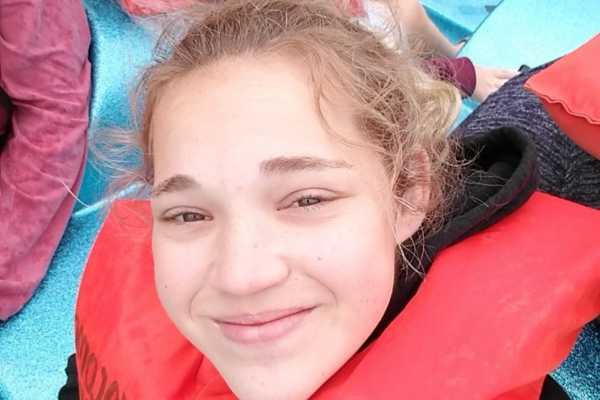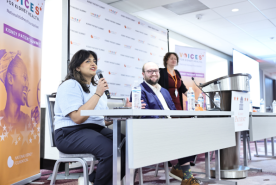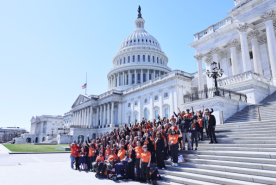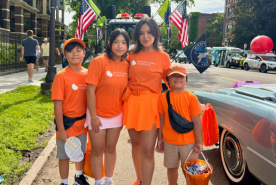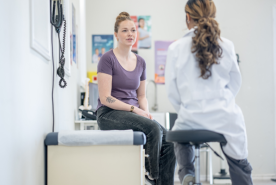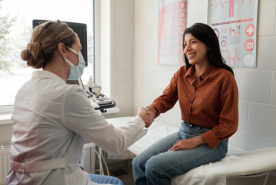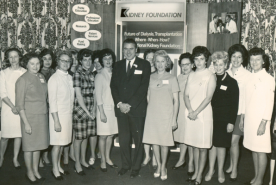May 21, 2024
Pool parties, rock wall climbing, and sleepovers are experiences many may take for granted. Not Maya Zarger. She developed kidney failure as a baby and was unable to participate in these activities as she grew up. That all changed when she turned nine and started attending Camp ChiMer, a camp experience designed specifically for kids with kidney disease.
Now an adult, Maya is ready to share her story and inspire more children with kidney disease.
Born with Kidney Disease
When Maya was six months old, her parents discovered blood in her diaper. Alarmed, they rushed her to a pediatrician.
“My symptoms and test results pointed to kidney disease. I went into kidney failure soon after,” said Maya. “I was diagnosed with atypical hemolytic uremic syndrome (aHUS), which is usually caused by E. coli. The doctors were confused because I never had E.coli. It was a genetic mutation that disqualified me from taking the treatment that was available at the time."
aHUS is a rare disease that causes the immune system to attack the cells lining blood vessels. This can lead to small clots that reduce blood flow to the kidneys, causing kidney damage. For Maya, the damage caused her kidneys to fail.
“I started peritoneal dialysis, a type of home dialysis that uses the inside lining of the belly as a natural filter, when I was a baby,” said Maya. “I didn’t have a typical childhood because I was constantly in the hospital with medical issues.”
At age ten, Maya developed peritonitis, inflammation in the lining of her abdomen. This temporarily disqualified Maya from the transplant list.
“I couldn’t do peritoneal dialysis at home anymore,” Maya said. “I did at-home hemodialysis for the next five years. My parents took the time to learn how to perform at-home hemodialysis and remodeled part of their home to accommodate the equipment. A year later I was put back on the waitlist. I hoped for a transplant but didn’t expect to get one anytime soon.”
Living with kidney failure is difficult. It can be even more challenging for children or adolescents. Here are five ways to support your child with kidney disease.
Camp ChiMer
Camp ChiMer offers a fun camp experience to children ages nine to eighteen with kidney disease or a kidney transplant, regardless of their medical needs.
When Maya was old enough, her family enrolled her.
“It was a part of my life every single summer afterward,” Maya said. “I loved it. There were so many firsts I got to do alongside kids who were just like me.”
Some of those firsts included foam dance parties, swimming, and laser tag–activities Camp offers.
“My favorite activity was the pool party. Most of us couldn't stay submerged in water due to the risk of infection. That meant no bathing or swimming,” Maya said. “Camp has nurses and doctors on staff so we could enjoy swimming like any other kid.”
Maya even looked forward to nighttime. Usually, she’d have to go to bed for dialysis. At camp, she had a sleepover.
“No kid wants to go to bed at 8:00 at night, especially during summer. At camp, we all gathered in the cabin for dialysis and spent all night talking,” Maya said. “When you are on dialysis, you don’t get to do sleepovers so this was so special to us.”
Most importantly, Camp allowed Maya and others like her to make friends for a lifetime.
“Everyone deals with self-consciousness. It’s another level dealing with scars and tubes. Camp was the one place I fit in. No one judged me because we were all going through something similar,” Maya said. “I was able to be myself fully at Camp. I met my best friends there because of that.”
A Life-Changing Transplant
A surprising call came through when Maya was fifteen–a kidney was available!
“I waited my whole life for that call. I’ll never forget the feeling. It was almost unbelievable. I had one last dialysis appointment before going into surgery,” said Maya. “ I was overwhelmed when I woke up from the transplant. I was excited to be alive but there were so many people standing around me.”
Maya asked everyone who didn’t need to be there to leave.
“Once the room cleared out, the hospital staff brought me a big chocolate chip cookie. With dialysis, you have so many food limitations and dietary restrictions. One of those being no chocolate,” Maya said. “It may have been the medication, but I was almost more excited about the cookie than the transplant.”
It took Maya a year to recover from surgery. Afterward, she attended high school full-time. As Maya navigated this new world, she started swimming more and became a cheerleader.
“Camp remained important after my transplant. While on dialysis, I was in school intermittently at best. Dialysis and doctor appointments took up the majority of my time,” said Maya. “I was thrust into high school without much school experience."
As a result, high school was more challenging for Maya than others.
"While I caught up with school work and made friends, it was a culture shock,” Maya said. “Camp was familiar and fun. My oldest and closest friends were there.”
Camp ChiMer remained a part of Maya's life until she aged out. She graduated high school and went on to get her cosmetology license. Today, she is living her best life and ready to give back to the Camp that gave her hope for the future.
"I want to pay it forward. I decided to become a Camp ChiMer Counselor to give those kids the best experience possible, just like I had," said Maya. "For those I won’t see at Camp, know that good things take time. It sucks to hear but be patient and know your future is bright. I wouldn't change my childhood for anything because they made me the person I am today.”
Are you the parent of a child or adolescent with kidney disease? Join NKF’s online community, Parents of Children with Kidney Disease.
Give Kids the Gift of Camp
Camp ChiMer allowed Maya to have fun and connect with friends her age who understood what she was going through. We need your help to give more kids with kidney disease a magical summer camp experience. Donate now to help give the gift of camp.
